The Magazines
Is The Nineteenth Century for December the first article, by Mr. Austin Hopkinson, is devoted to an explanation of why
Mr. Baldwin is the most trustworthy leader in politics to-day : the second, by Mr. Richard Jebb, is a plea for a new party with a new kind of leadership, apparently to be supplied by the Press barons, as the only hope of a sane Imperial policy. The most helpful political article is perhaps that on " The Machinery of Government," by Lt.-General Sir Gerald Ellison, who urges that the principle of separating executive from administrative functions should be reinstated in our Constitu- tion, and quotes both a parliamentary committee and the experience of the Army in such a way as to make out a strong case. Professor Julian Huxley explains what " indirect rule ' means in East Africa, and Mr. S. K. Ratcliffe considers the Round Table Conference in the light of the situation in India under the title " India : The Supreme Opportunity." Mr.
Michael Sadleir again speaks winged words, this time about our placards and notices, lettering and postage stamps. Dr. Hog- berg Wright contributes a historical sketch of " Renaudot, Father of French Journalism," which seems to show that the difficulties of an independent Press must have been the same throughout the history of journalism.
In The Contemporary, Mr. G. E. R. Gedye's article on " The Fascist Thrust in Austria " should be read by every amateur
student of world affairs for its lucid summary of politics in " the rum Balkans," as he aptly names the succession States and Italy. A review of the first volume of Biilow's " Memoirs," by Dr. G. P. Gooch, is also both important and good reading. Mr. S. K. Ratcliffe here explains some of the bearings of the Republican losses in the recent American elections. " What Africa is not," by Grace Flandrau, is a: amusing exposure of some latter-day " intrepid explorers." Ms. George Glasgow deals again with two aspects of his favourite subject, French finance, and is also well worth reading on the effects of prolonged civil war on Chinese youth.
In The Fortnightly, Mr. Aldous Huxley's " Notes on Liberty," luridly advertised on the cover, are not so exciting to read.
" Augur" on the other hand, in " Green Roots, Dead Boughs," is unexpectedly encouraging to British Socialism. Professor H. M. Wodehouse explodes a few popular fallacies about heredity, especially the criminal variety. Mr. L. A. G. Strong writes very sanely, yet hopefully, about the new task that confronts the modern schoolmaster. Mr. Frank Kendon con- tributes a really beautiful poem, " The White Fawn." " Felipe," a short story by Mr. Peter Fleming, just misses the same quality by being cut too short.
Blackwoods opens with an admirable account of a military attaché's work in war-time; "The Lighter Side of Gandhism,' by Rosamund Wilcockson, contains some probably uncon- scious tributes to the power of Congress, and a little mild humour. " Some Book-Hunting Adventures," by Mr. R. S. Garnett, are better, and less bookish, than ever.
The National Review has one article on South America and one on Spain, to show the value which each may be to Great
Britain, both commercially and culturally. There is also a welcome critical article on thrillers and detective novels, by Mr. Bonamy Dobtt'.e.
The Adelphi continues Mr. Middleton Murry's religious series and his reminiscences of D. H. Lawrence, bringing
the latter up to the Armistice. " Those Russians," by Mr. John Chapin Mosher, is an amusing short satire. Mr. Roger Clarke's series on the Public Schools is continued, and there is a Christmas book supplement containing work by Edmund Blunden, Herbert Read and others.


























































 Previous page
Previous page